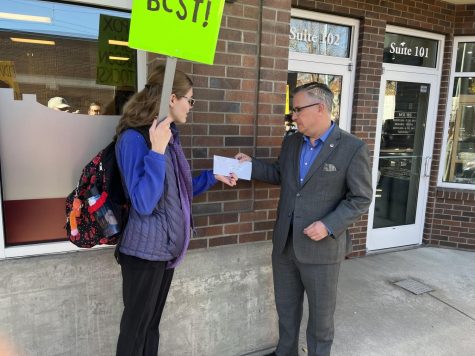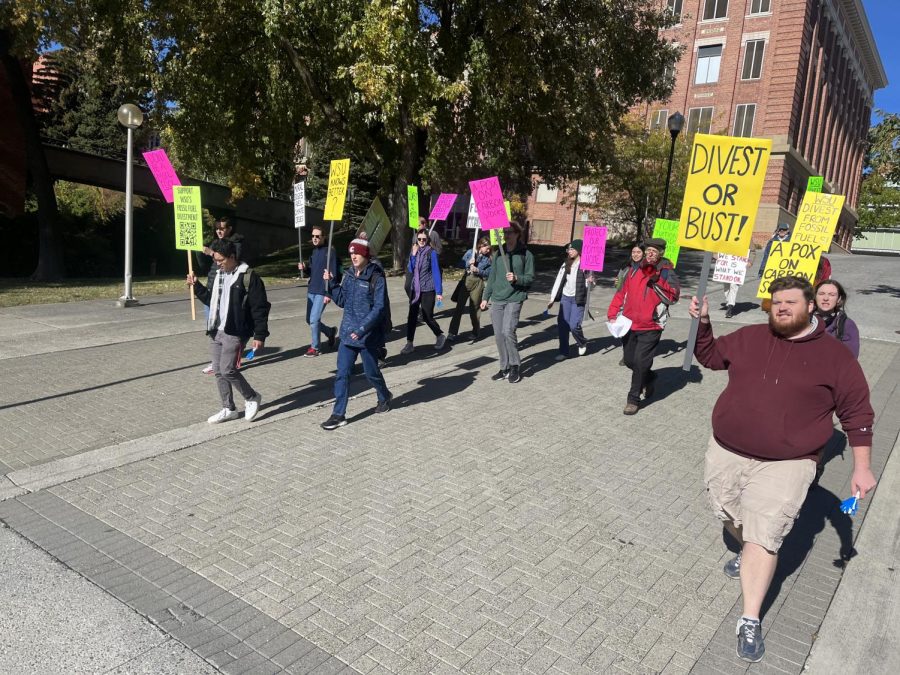‘Divest our school from fossil fuels’
Around 79 institutions have joined together to partially or fully divest in fossil fuels.
Fossil Free March attendees march toward the president’s office.
October 28, 2022
The Environmental Sustainability Association and Fossil Free WSU held a rally and march from 12-2 p.m. on Thursday, encouraging WSU to fully divest from fossil fuel companies.
“It is our duty as the next generation and the sake of many generations to stop the destruction of our future,” said William Engels, ESA member and graduate writing assistant.
Engels called upon WSU to join alongside 79 other universities and institutions to reinvest in sustainable and green companies.
“We’ve seen the power of this type of activism just this last month, with the University of Washington Board of Regents to fully divest from fossil fuel companies by 2027,” he said.
Engels has tried to obtain which companies WSU’s endowment is invested in, but he was often met with responses implying the WSU Public Records Office was short-handed and lacked time before finally recieving a response, he said.
He said shortly after they began their advocacy, the Board of Regents did research and uncovered that the university did have investments in fossil fuels.
Daniel McCloskey, second-year graduate student in anthropology, is unaffiliated with ESA, but he led the charge with a booming voice and in full support after hearing about the march through email.
“I mean if we’re not worried about climate change, then what are we doing here?” McCloskey said. “This is the largest problem mankind has ever faced, and the actions of those in power are unacceptable given the scientific evidence.”
Upon arriving at the President’s suite after a mile-long march, Engels and Olivia Hallquist, junior wildlife ecology and conservation sciences major, delivered a letter to Phil Weiler, WSU vice president of marketing and communications, with a list of their demands regarding fully divesting from fossil fuel companies.

Hallquist believes WSU should take more charge and set an example for practicing sustainable practices, she said.
“As a land grant university, we’re essentially supporting the fracking of oil, gas and coal, which is frankly ironic and embarrassing,” Hallquist said.
Hallquist said many fossil fuel companies are no longer as profitable as they once were, and the university would be doing a disservice to itself for not reinvesting as people are switching to green energy.
Weiler praised the group’s conduct and actions, and he believes the two sides will be able to come to an agreement that both are satisfied with, he said.
“It’s one thing to say you know, we are unhappy with a situation, but then not able to kind of actualize that,” Weiler said. “They’re being consistent, they’re attending those meetings, they’re sharing their points of view and they’re doing it in a logical and respectful way.”
He said WSU President Kirk Schulz has decided to create a committee looking at sustainability as a whole rather than just divesting fossil fuels.
“There’s a broader move[ment] around the country, not only looking at companies not investing in fossil fuels, but a broader environmental sustainable governance,” he said.
The Board of Regents has been looking at models from other Pac-12 schools that have decided to fully divest, including UW, he said.
One of the other demands put forward was to have representation on the Environmental Sustainability Task Force, which is working on investment principles on environmental, social, and corporate governance, Engels said.
WSU does not directly invest their endowments, Weiler said. The school commissions a third party known as the WSU Foundation to invest the university’s philanthropic gifts.
Engels said the Regents can push the foundation to reinvest their stakes in fossil fuel into more sustainable and environmentally friendly companies.
Engels is optimistic and excited about ESA’s meeting with Schulz on Nov. 10 and believes the march was positive for increased student engagement, he said.
Should the university fully divest, Engels said he wants to move toward financial institutions that currently have large holdings in the top 200 fossil fuel companies.















